 |
|
 |
|
|
|
|
This is the section of the website devoted to news, tips, special offers and to recognize the members of the Big Stretch community.
|
[Posted on Sunday, January 31, 2021, filed under Yoga Tip of the Month]
The Plough pose (Halasana in Sanskrit) is a continuation of Shoulderstand. Hala means plough, the shape which this asana or posture resembles. This relaxing posture is a panacea for most common ailments and offers the following benefits:
- Stimulates the thyroid and parathyroid glands
- The spine receives an extra supply of blood due to the forward bend and this helps to relieve backache
- Abdominal organs are rejuvenated due to contraction
- Relieves stiff shoulders
- Rejuvenator, reverses the effects of gravity on the body
- Stretches the neck and upper spine, strengthens spine
- Encourages deep abdominal breathing because it limits use of the top of your lungs
- Calms the nervous system
- Firms and tones the whole body
- Prevents or relieves varicose veins, asthma, insomnia, constipation, premenstrual disorders, and menopause disturbances
- Known as the "hangover" cure and relieves tension headaches
- Not suitable in cases of spinal weakness or severe ailments of the neck and head.
If you are new to yoga or not as flexible you can bend your knees and rest them on or close to your head, or let your feet rest on a chair or bolster behind you.
If you are more flexible, you may drop your knees to either side of your ears, resting your shins and feet on the floor and place your hands on the backs of your knees. This is known as the Choke pose.
|
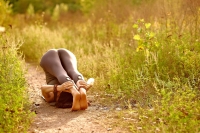 |
|
[Posted on Wednesday, January 27, 2021, filed under Yoga Tip of the Month]
The triangle pose increases strength and flexibility of the feet, legs, hips and back. The pose also relieves back pain, tones the waist and strengthens the neck. It also improves circulation, digestion and elimination.
The triangle pose is also known to stimulate the heart chakra as you open your chest and lift your heart up towards the sky allowing you to radiate joy.
As you are practicing this pose, imagine that you are standing against a wall, or between two planes of glass so that you may line up the shoulders over the thigh. Practicing with straight legs, the lower hand might reach to the thigh, shin or the floor. You may also practice with a block, resting your hand on the block for balance and stability.
If you are experiencing pain in the upper shoulder, feel free to rest your hand on your hip but continue to lift the heart up towards the sky.
|
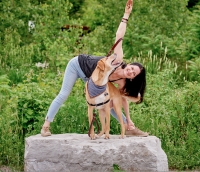 |
|
[Posted on Wednesday, January 27, 2021, filed under Yoga Tip of the Month]
Supported Child's pose or Salamba Balasana is a lovely restorative yoga pose that fosters reconnection with the breath, relieves lower back tension and releases tight shoulder muscles.
To practice this soothing posture, come into a wide-legged Child's Pose and place a bolster between your thighs. Let your belly and chest melt into the support and totally relax your arms and shoulders. Turn your face to one side, feeling free to turn to the opposite cheek at anytime. You may choose to tuck a zafu or blanket under or above the bolster to adjust the height allowing you to release completely.
Enjoy!
|
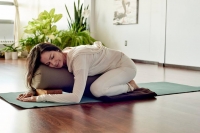 |
|
[Posted on Wednesday, January 27, 2021, filed under Yoga Tip of the Month]
Pranayama, or rhythmic breath control, is the Yoga of Breathing. Prana is the life force or vital energy of the body. The breath revitalizes the body, balances the emotions and creates clarity of mind.
There are three steps in breathing - INHALATION, RETENTION OR PAUSE, and EXHALATION.
Sitali or Cooling Breath is a breathing technique which purifies the blood, cools the system, quenches thirst, stimulates the liver and spleen, improves digestion and calms the nervous system and mind. The breath passing over the tongue cools the body, perfect for hot weather conditions.
Curl your tongue upwards to form a trough through which the air is drawn. The tongue is kept between the lips and curved upwards like the letter "u". Inhale by drawing air through the mouth as though you were sipping through a straw. Close the mouth, retain the breath for a few moments and then exhale through the nostrils. Repeat several times.
|
 |
|
[Posted on Wednesday, January 27, 2021, filed under Yoga Tip of the Month]
The Big Stretch recommends warm, whole, organic milk, spiced (any or all of the following - coriander, cardamon, ginger, nutmeg, cinnamon, rose petals, lavender) with a dab of ghee.
Enjoy as a snack mid afternoon, when you are on the run, if you are feeling peckish before yoga class or as a lovely snack before bed inducing a deep sleep. Serve warm to hot. You can prepare ahead of time and keep in a thermos hours before enjoying which increases the herbal potency of the drink as the spices are slow-cooked.
Enjoy!
|
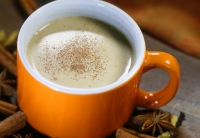 |
|
[Posted on Wednesday, January 27, 2021, filed under Yoga Tip of the Month]
Bloom where you are with this simple meditation.
Sit quietly and comfortably with your eyes closed.
Let your breath be slow and relaxed.
Lengthen your spine by lifting your heart.
Hands are held at the heart in prayer, keeping thumbs and pinkies touching, the palms move away from one another, fingers spread, forming a cup or blossoming flower shape.
Visualize a beautiful white lotus flower blooming inside of you.
Breathe into its essence for several minutes.
|
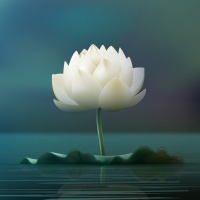 |
|
[Posted on Wednesday, January 27, 2021, filed under Yoga Tip of the Month]
A yogic classic, Uttanasana is sanskrit for intense stretch or simply a standing, forward bend.
The standing forward bend stretches the entire back side of your body, tones the abdomen, refreshes the mind and clears your head. I like to think of this pose as a rejuvenator or mother nature's face-lift pose. No botox necessary here - reversing the effects of gravity on the face.
Standing with feet hip-width apart (you might choose a wider stance if there is a lot of back tension or you are pregnant), outer edges of the feet are parallel to the edges of your mat, exhale and bend forward at your hips. In a perfect world, your legs would be straight, however, if you are just warming up, have tight hamstrings or the low back is pulling you may choose to bend the knees any amount that feels right for your body. Try not to rock your weight back into your heels, but distribute the weight evenly over your feet.
Grabbing opposite elbows creates a nice traction for the spine, however there are many variations such as grabbing the big toes or stepping onto the hands, palms up, fingers towards the heels.
Do not be concerned with how far you can bend forward, but can you let go in your pose. Can you be at peace with what is? Let the head hang, you may want to give the head a little shake to let go of holding in the neck.
Variations: More challenge: interlocking the fingers behind the back and reaching the hands away from the hips, stepping the feet together and grabbing opposite elbows behind the legs or you might simplify by resting your forearms on your thighs with bent knees or resting your hands on blocks or a bolster. If you are not sure how to make the pose your own please feel free to ask me for one of many variations to add more challenge or simplify the pose. How fabulous that we can all do the same poses, but look completely different and still reap the benefits and stillness of the practice.
|
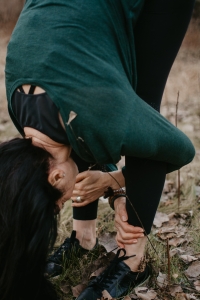 |
|
[Posted on Wednesday, January 27, 2021, filed under Yoga Tip of the Month]
Yoga is an inward journey. Be mindful of your fellow yogis and yoginis and do keep casual conversation before and during class to a minimum.
Many students take the time before class to unwind, release their day and practice meditative contemplation. For some, this may be the only quiet time that they have during the week. When speaking with others inside the practice space, please be aware and respectful of those who are choosing to spend this time in silence by keeping your voice low, and avoiding any unnecessary noise.
Thank you.
|
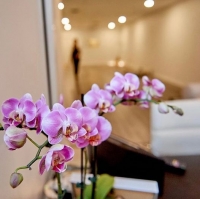 |
|
|
 |
 |
 |
|
 |